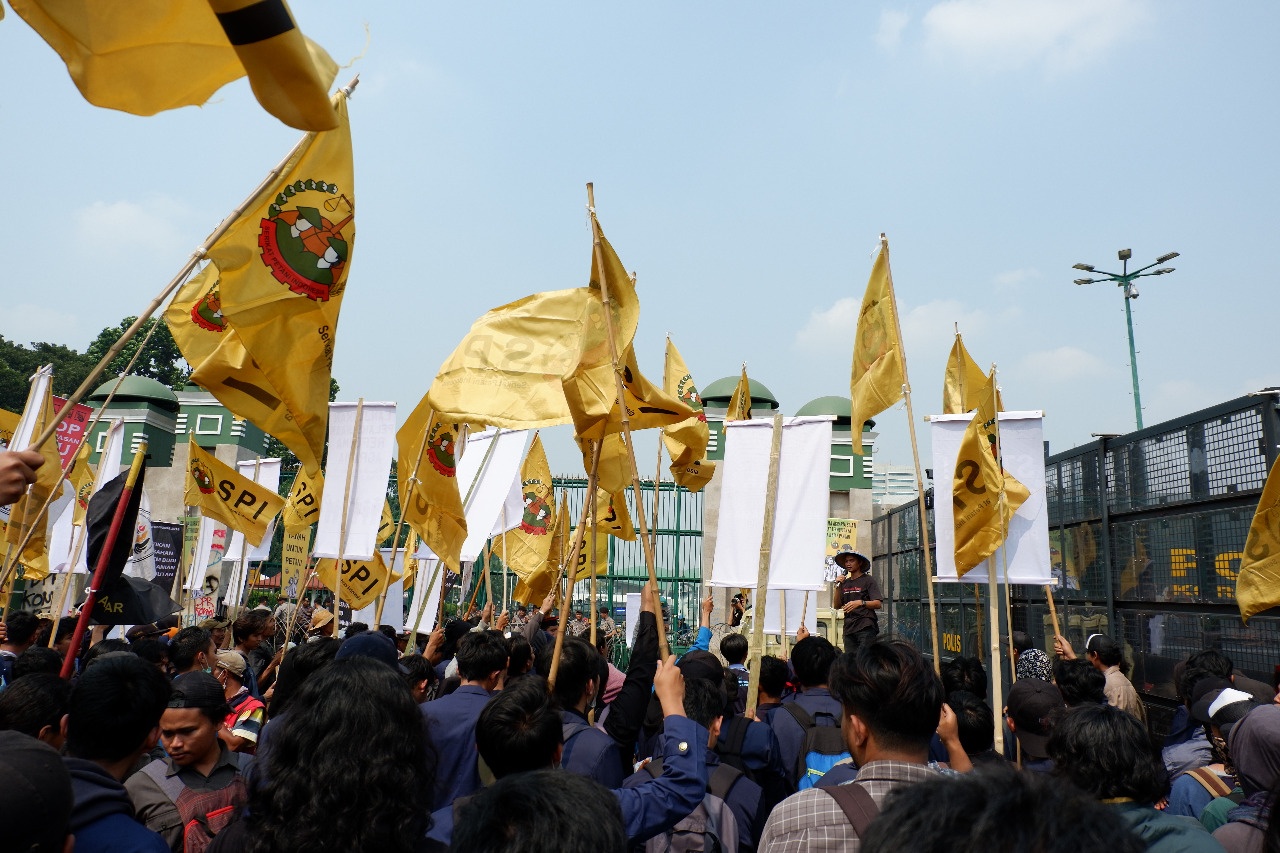JAKARTA. The Job Creation Law recently passed by the House of Representatives (DPR) threatens peasants as the main actor in agricultural development in Indonesia says Henry Saragih, the Chairperson of the Serikat Petani Indonesia (SPI).
“The Job Creation Law also ignores peasants who are the backbone of agricultural development in Indonesia, small-scale or small-scale peasants, with an average farming area of less than 0.5 hectares, and even landless peasants or tenant peasants.”
“The form of this threat can be seen from the elimination of several provisions that have prioritised Indonesian peasants as the main producers of food in Indonesia and protection against food imports that harm peasants. The Job Creation Law removes several provisions in the existing law that have been in favour of small peasants, ” Henry explained.
According to Serikat Petani Indonesia, the following guarantees have been overridden by the Job Creation Law;
- Law on Protection and Empowerment of Farmers No. 19 of 2013
- Article 15 paragraph (2) in Law No. 19 of 2013 is deleted. So that there are no more provisions which oblige prioritizing domestic agricultural production;
- Article 30 of Law No. 19 of 2013 is amended so that there are no provisions prohibiting imports of agricultural commodities when domestic food availability is sufficient;
- Article 101 of Law No. 19 of 2013 is abolished so that there are no sanctions for persons / parties importing agricultural commodities when domestic food availability is sufficient.
Law No.18 of 2012 concerning Food
Article 1 point 7 in the Food Law is amended so that the phrase “import if the two main sources cannot fulfill the need” is abolished and replaced to “import food” only;
Article 14 paragraph (1) is added with the phrase ‘import of food’ in the Job Creation Law, so that the source of food supply can come from imported food. This has implications in paragraph (2) of the same article, where the provisions on food import which were previously allowed only if the source of food supply (domestic production and national food reserves) are eliminated;
Article 15 paragraph (1) in the Food Law is amended. The Job Creation Law eliminates the phrase “prioritizing domestic food production to meet food consumption needs”;
The sentence ‘which does not have a negative impact’ in article 39 which reads ‘the government establishes Food Import policies and regulations that do not have a negative impact on the sustainability of farming, increased production, the welfare of farmers, fishermen, fish raisers and micro and small Food Business Actors’ is changed in the Job Creation Law, so that it reads: ‘The Central Government determines Food Import policies and regulations in the framework of sustainable farming, Improving the welfare of farmers, fishermen, fish raisers, micro and small Food Business Actors;
Law No.13 of 2020 concerning Horticulture
Article 63 of the Horticultural Law is abolished the Job Creation Law so that it is no longer regulated the import and export of seeds to and from the territory of the Republic of Indonesia is required to obtain a permit. This means that commercial seeds from outside are free to enter and circulate in the territory of the Republic of Indonesia;
Article 92 of the Horticulture Law is amended by including the phrase “origin of import” in the article. As a result, the provisions that bind market organizers and other places to prioritize the sale of local horticultural products are no longer valid. It is feared that the fate of farmers with horticultural crops in Indonesia will be oppressed, given that Indonesia’s NTP data in 2020 shows that the Horticulture sub-sector NTP continues to decline;
Article 100 of the Horticulture Law is simplified so that it has the potential to run into the Indonesian Constitutional Court Decision number 2140/20 / PUU / 2014 concerning the Judicial Review of the Law 13/2010 on Horticulture. The Constitutional Court decision states that the amount of foreign investment is limited to a maximum of 30% (thirty percent). The Job Creation Law does not include any restrictions related to allowed foreign capital, and will only be further regulated in the statutory regulations in the investment sector.
Henry added that SPI will always be at the forefront in this matter, when there are regulations that make small farmers more impoverished, miserable, and eliminate the sustainability of small farmers. “Farmers reject the Job Creation Law”, he said.

